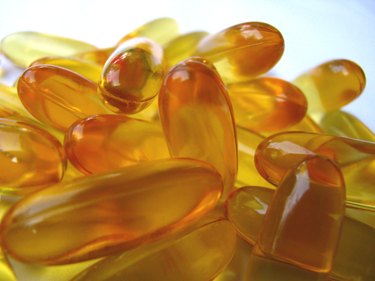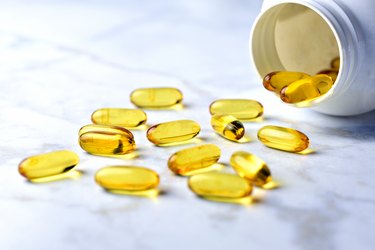
It doesn't take much research to conclude that the standard American diet isn't the healthiest. Standard grocery stores are filled with packaged foods high in trans fat and sugar.
While indulging every so often is no biggie, frequent or daily consumption of such unhealthy foods can lead to the growth of plaque in the arteries. While lifestyle changes are the most effective way to decrease this buildup, there are other measures, including certain vitamins and supplements, that can help lower levels of plaque in the arteries.
Video of the Day
Video of the Day
What Is Atherosclerotic Plaque?
Your arteries deliver oxygen-rich blood from your heart to the rest of your body. However, the arteries can become blocked with atherosclerotic plaque (fatty substances), inhibiting the movement of blood through the body. A buildup of atherosclerotic plaque over time can lead to such serious problems as heart attack and stroke, according to the National Heart, Lung and Blood Institute, a division of the National Institutes of Health (NIH).
Treating Plaque Buildup
The first measure that most doctors recommend for the treatment of plaque buildup involves healthy lifestyle changes, according to the NIH. This includes a healthier daily diet, lowering body weight to a healthy level, managing stress and increasing physical activity.
If arterial blockage reaches a dangerous level, your doctor may prescribe certain medications to treat this condition. Cholesterol medications are among the most popular to treat plaque buildup, according to the Mayo Clinic. Lowering the levels of LDL, or "bad," cholesterol can slow, stop or even reverse blockage. Anti-platelet medications, like aspirin, reduce the likelihood that platelets will gather in the blocked artery, causing blood clots.
Vitamins and Supplements That May Help
Although vitamins alone can not clear plaque completely, certain supplements may help improve your heart health, preventing accumulation in the arteries. While some studies have shown a link between vitamin C and improved lipid profiles, these results have not been largely confirmed, according to a 2016 review of vitamin C and heart health published in The International Journal of Molecular Studies. Nevertheless, vitamin C deficiency has been linked with a higher rate of death due to cardiovascular disease.
Omega-3 fatty acids, which are commonly found in fatty fish such as salmon and albacore tuna, help increase the "good" cholesterol in the body and lower triglycerides (a type of potentially harmful fat in the body), according to Fisher-Titus Medical Center. If you're not a big fan of eating fish, fish oil pills are a great way to get more omega-3s into your diet. Flaxseed, chia seeds and walnuts are also good sources of the nutrient, according to the NIH's Office of Dietary Supplements.
The Bottom Line
While supplements are a quick and simple way to get a dose of healthy vitamins and nutrients, it's better to get what you need from the food you eat, according to Harvard Health Publishing. The typical diet is poor in nutrients and is filled with unhealthy chemicals. Replacing processed foods with nutrient-dense options — like vegetables, fruit, whole grains and healthy proteins — will help prevent plaque buildup more effectively than any supposed magic pill.
- National Heart, Lung and Blood Institute: "Atherosclerosis"
- Mayo Clinic: "Arteriosclerosis / atherosclerosis"
- The International Journal of Molecular Studies: "Vitamin C and Heart Health: A Review Based on Findings from Epidemiologic Studies"
- Fisher-Titus Medical Center: "CARDIOVASCULAR Eat These 10 Foods to Cleanse Your Arteries"
- Harvard Health Publishing: "Should you get your nutrients from food or from supplements?"
- Office of Disease Prevention and Health Promotion: "Current Eating Patterns in the United States"
- American Heart Association: "Fish and Omega-3 Fatty Acids"
- NIH Office of Dietary Supplements: "Omega-3 Fatty Acids"
Is this an emergency? If you are experiencing serious medical symptoms, please see the National Library of Medicine’s list of signs you need emergency medical attention or call 911.


